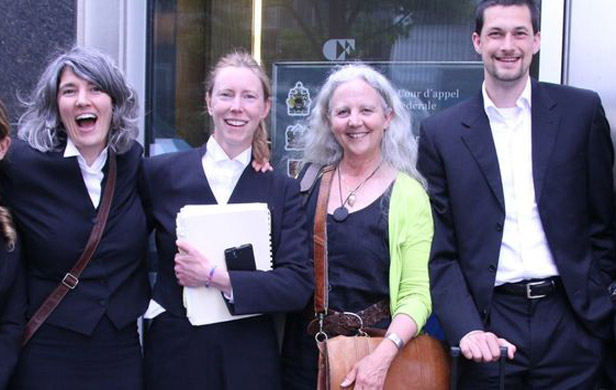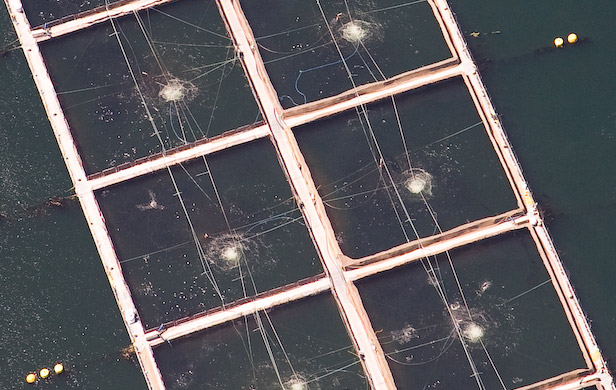On May 6th, Justice Donald J. Rennie of the Federal Court ruled against Marine Harvest Canada and the Minister of Fisheries and Oceans, confirming that the transfer of young salmon infected with piscine reovirus into ocean net-pens was illegal. This victory by Alexandra Morton and her Ecojustice lawyers was dismissed by aquaculture giant Marine Harvest as having merely administrative effects that will not impair “the company’s day to day business” or impede “the ongoing transfer of farm-raised salmon between facilities in B.C.” But Justice Rennie’s ruling could have major implications for both salmon farming and wild salmon.
First, the ruling confirms that the Minister cannot contravene the legislation in the “Fisheries (General) Regulations” (FGR), which occurred when the salmon farming industry was allowed to transfer diseased salmon into its net-pens. And, second, the Minister cannot legally delegate to the industry the responsibility to decide whether or not putting diseased fish into the ocean is “low risk”.
Industry’s slippery language
In a carefully worded defence, Marine Harvest claimed, “There was no evidence that [it] transferred unhealthy fish” from its Dalrymple hatchery to its Shelter Bay net-pens. But the smolts transferred in March 2013 were known to have piscine reovirus (PRV), a highly infectious virus that scientific research describes as the causative agent of Heart and Skeletal Muscle Inflammation (HSMI). This heart infection can so weaken fish that they are barely able to swim.
Since PRV only manifests as HSMI about 5 to 9 months after transfer to sea water, Marine Harvest’s smolts were technically asymptomatic and therefore not obviously “unhealthy”. But many were infected with piscine reovirus. If farmed salmon with HSMI are barely able to swim in the protection of net-pens, then infected migrating salmon are likely to sink to the bottom of the ocean or be eaten by predators, essentially eliminating any evidence of HSMI in wild salmon.
New, fast-growing virus

Piscine reovirus is a relatively new virus first recognized in Atlantic salmon farms in Norway in 1999, then identified by research in 2010 as the causative agent for HSMI, a conclusion confirmed in Justice Rennie’s ruling. PRV is now ubiquitous in Norwegian salmon farms with HSMI a major cause of death — unfortunately, about 14% of Norway’s wild salmon are now infected with HSMI. A scientific paper published in 2013 reports that the genetic sequence of PRV found in BC matches the strain found in northern Norway in 2007, suggesting that PRV came to BC in Atlantic salmon eggs. Since the virus was only identified in 2010, no one knew to look for it when the millions of farmed salmon eggs were being imported into BC. Genetic sequences of the virus have now been found in BC’s farmed Atlantic salmon, as well as in some native steelhead, cutthroat trout, chum and other wild species, suggesting the possible spread of PRV from salmon farms to BC’s marine ecology.
This is the eventuality that has haunted Morton since she became concerned that salmon farming could import alien diseases to BC’s wild salmon populations. The virulence of PRV in wild fish and the extent of its HSMI damage have yet to be determined. But the potential for an ecological catastrophe is heightened by the virus’s ability to mutate readily, particularly in the crowded conditions of salmon farms. The lack of a barrier between the farmed stock and migrating wild fish seriously questions the wisdom of growing salmon in ocean net-pens.
Industry given 4 months
In recognition of the far reaching implications of his judgment, Justice Rennie has suspended his ruling for 4 months. Given that most salmon farms are likely infected with piscine reovirus, and the disease may now be endemic in their smolts and eggs, Morton’s court victory presents a formidable challenge for the industry and for those charged with ensuring the safety of wild salmon.
EDITOR’S NOTE: DFO and Marine Harvest have launched an appeal of of the above case. Alexandra Morton and Ecojustice are vowing to battle the appeal in court.



These fish farm owners will argue in court right up until the last wild salmon is infected that it cant be “proven” they were the cause.
And then they will appeal any decision again and agian and again.
They should be forced to pay for the plaintiffs legal fees each time they lose.
If all the fish are gone it will be a hollow “victory”.
Nature trumps lawyers with common sense every time.
But it’s time we dont have.
These fish infections are only going to spread.
First they have to change the law,then launch the appeal…oh ya change the judge too,cuz thats what they do,all that money marine harvest puts out for campaign funds and lobbyists has to mean something
It must be about the right time to “short” Marine Harvest stock!!!!
Hooray for the Good Guys and Gals!
Thanx, Ray Grigg!